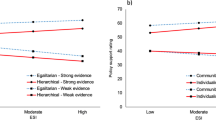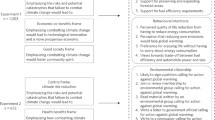Abstract
The likely adverse effects of climate change call for political action. In this paper, we argue that the public reason framework—with its insistence on justifiability to all reasonable citizens, in spite of their profound disagreements—despite initial misgivings recommends itself as a framework for debate and decisions pertaining to climate change. We address two possible stumbling blocks: the exclusion of non-anthropocentric points of view, and the controversy over intergenerational justice. We argue that public reason can deal with these problems. Moreover, we argue that both strongly idealized (in Rawls's vein) and moderately idealized (using Gaus as a foil) versions are able to address these issues. Moreover, public reason, as a family of views emphasizing disagreement and justifiability to all reasonable citizens, can help secure the stability of political orders, and hence contribute to sustained and demanding efforts to combat the adverse effects of climate change.
Similar content being viewed by others
Notes
We follow here the list of assumptions made by Sinnott-Armstrong (Sinnott-Armstrong 2011).
We do not mean that any and all aspects of state action concerning abatement and adaptation need to be seen as fundamental. We only claim that a not-negligible portion of those actions should (and can) be seen as such.
It may be queried whether the distinction between strong and moderate idealization holds in the way we assume, and whether Rawls's project relies on strong idealization. We thank an anonymous referee for pointing this out. First, we admit that idealization comes in degrees, but that there are genuine differences. The juxtaposition of Rawls and Gaus as using ‘strong’ and ‘moderate’ has precedents in the literature (Quong 2017; see also Vallier 2019, pp. 98ff.). Second, it is arguable that Rawls towards the very end of his career relied less on the Original Position (surely a device of strong idealization) and more on a less idealized Public Reason view, even allowing some degree of pluralism as concerns justice; yet it is also arguable that mainstream Rawlsianism leans more towards the strong idealization view, whereas figures such as Gaus and Vallier should be seen as proponents of a less idealized view. See, e.g., Gaus on Rawls in Gaus (2011, pp. xvii, 38f., 284).
There have been several attempts to align Rawls and climate change action. However, we have found no papers that directly addresses the public reason dimension of Rawls's work and climate change as we do here. Also, many have criticized Rawls's programme for being unable to adequately deal with the challenges of climate change, viz. Bell (2004), Buchanan (2000), Gardiner (2011a).
There are of course other ways of showing that Rawlsian theory without modifications is up to the task. Sarah Kenehan presents an interesting defence of the robustness of the duty of assistance in this regard.
For a thorough and critical account of the evolution of Rawls's thoughts on this account see Heyd (2009).
This is admittedly vague. Gaus does not demand of deliberators that they are highly sophisticated, ‘post-conventional’ (Kohlbergian stage 5 or 6) reasoners (Gaus 2011, p. 277).
We thank an anonymous referee for this and the following point.
As a final line of thought, Gaus’s framework may be compatible with climate action on grounds of non-interference: If adverse effects of climate change can be construed as (illegitimate) interference, then the members of the public would be justified in pursuing policies to mitigate or even cancel out these effects. We are thankful for an anonymous referee for this suggestion, but for reasons of space we cannot pursue it further here; see, however, e.g., Gaus (2011 pp. 341ff.).
References
Bell, D.R. 2004. Environmental refugees: What rights? Which duties? Res Publica 10: 135–152.
Bell, D.R. 2006. Political liberalism and ecological justice. Analyse & Kritik 28: 206–222.
Benn, S. 1988. A theory of freedom. Cambridge: Cambridge University Press.
Buchanan, A. 2000. Rawls’s law of peoples: Rules for a vanished westphalian world. Ethics 110 (4): 697–721.
Calder, G. 2011. Climate change and normativity: Constructivism versus realism. Critical Review of International Social and Political Philosophy 14: 153–169.
Cudd, A., and S. Eftekhari. 2017. “Contractarianism”. https://plato.stanford.edu/entries/contractarianism/. Accessed 6 May 2021.
Dobson, Andrew. 1998. Justice and the environment: Conceptions of environmental sustainability and theories of distributive justice. Oxford: Oxford University Press.
Gardiner, Stephen M. 2011a. Rawls and climate change: Does Rawlsian political philosophy pass the global test? Critical Review of International Social and Political Philosophy 14: 125–151.
Gardiner, Stephen M. 2011b. A perfect moral storm: The ethical tragedy of climate change. Oxford: Oxford University Press.
Gaus, G. 2011. The order of public reason: A theory of freedom and morality in a diverse and bounded world. Cambridge: Cambridge University Press.
Gaus, G. 2015. Public reason liberalism. In The Cambridge Companion to Liberalism, ed. S. Wall, 112-140. Cambridge: Cambridge University Press. https://doi.org/10.1017/CBO9781139942478.008.
Heyd, D. 2009. A value or an obligation? Rawls on justice to future generations. In Intergenerational justice, ed. A. Gosseries, and L.H. Meyer, 167–188. Oxford: Oxford University Press.
Kunnas, J. 2012. The theory of justice in a warming climate. Electronic Green Journal. https://doi.org/10.5070/G313412180.
Larmore, C. 2003. Public reason. In The Cambridge Companion to Rawls, ed. S.R. Freeman, 368–393. Cambridge: Cambridge University Press.
Lister, M. 2011. The order of public reason: A theory of freedom and morality in a diverse and bounded world. Notre Dame Philosophical Reviews.
Manning, R. 1981. Environmental ethics and Rawls’ theory of justice. Environmental Ethics 3 (3): 155–165.
Peffer, R.G. 2014. Marxism, morality, and social justice. Berlin, Boston: Princeton University Press.
Quong, J. 2010. Liberalism without perfection. Oxford: Oxford University Press.
Quong, J. 2017. Public Reason. https://plato.stanford.edu/entries/public-reason/. Accessed 8 Jan 2021.
Rawls, J. 1993. Political liberalism. New York: Columbia University Press.
Rawls, J. 1997. The idea of public reason revisited. The University of Chicago Law Review 64 (3): 765–807. https://doi.org/10.2307/1600311.
Rawls, J. 2001. Collected papers. Edited by Samuel Richard Freeman. 4. printing. New York: Harvard University Press.
Rawls, J. 2005. A theory of justice. Original. Cambridge: Belknap Press.
Raz, J. 1994. Facing diversity: The case of epistemic abstinence. In Ethics in the public domain, ed. J. Raz. London: Clarendon Press.
Sinnott-Armstrong, W. 2011. It's not my fault. In Gardiner et al 2010, Climate ethics: Essential readings. Oxford: Oxford University Press
Stern, N. 2011. The economics of climate change. In Gardiner et al. 2010, Climate ethics: Essential readings. Oxford: Oxford University Press.
Vallier, K. 2019. Must politics be war? Oxford: Oxford University Press.
Wallack, M. 2006. Justice between generations: The limits of procedural justice. In Handbook of intergenerational justice, ed. Jörg. Tremmel, 86–105. Cheltenham: Elgar.
Wenar, L. 2008. John Rawls. In The Stanford encyclopedia of philosophy. https://plato.stanford.edu/entries/rawls/. Accessed 7 May 2021.
Wolf, C. 2009. Intergenerational justice, human needs and human rights. In Intergenerational justice, ed. Axel Gosseries and Lukas H. Meyer. Oxford: Oxford University Press.
Acknowledgements
The authors would like to thank the practical philosophy research group at Copenhagen University and the anonymous referees at Res Publica.
Funding
No funding.
Author information
Authors and Affiliations
Corresponding author
Ethics declarations
Conflicts of interest
The authors declare that they have no competing interests.
Additional information
Publisher's Note
Springer Nature remains neutral with regard to jurisdictional claims in published maps and institutional affiliations.
Rights and permissions
About this article
Cite this article
Nielsen, M.E.J., Hauge-Helgestad, A. Come as you are? Public Reason and Climate Change. Res Publica 28, 17–32 (2022). https://doi.org/10.1007/s11158-021-09517-0
Accepted:
Published:
Issue Date:
DOI: https://doi.org/10.1007/s11158-021-09517-0




